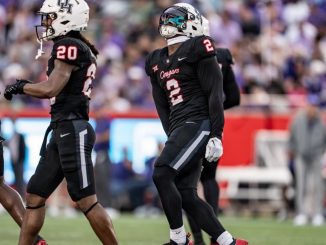
LSU splits president-chancellor roles, makes two hires
by Piper Hutchinson, Louisiana Illuminator
November 4, 2025
The LSU Board of Supervisors has named Wade Rousse its next system president and picked University of Alabama Provost Jim Dalton as chancellor and executive vice president of its Baton Rouge campus.
The dual hires mark the first time the university will have separate system and main campus leaders since the roles were merged in 2012.
Rousse is currently president of McNeese State University, a small regional university in Lake Charles where he has held that role since 2024. He previously held other administrative jobs at the school since 2019. The board approved his hiring on a unanimous vote.
The Lake Charles native earned his undergraduate degree from McNeese, an MBA from the University of New Orleans and his doctorate in economics from the University of Illinois Chicago.
Rousse was favored for the LSU presidency by board Vice Chairman Lee Mallett, also a Lake Charles native and a major political donor to Gov. Jeff Landry.
In an address to the board after he was hired, Rousse said he discussed LSU’s management structure with Dalton, and they made an agreement in principle athletics, external affairs and government relations would fall under the president’s responsibility, while Dalton will oversee academics and research.
LSU Board Chairman Scott Ballard said specifics about reorganization of LSU System would have to be voted on by the board at its next meeting on Dec. 11.
In his newly created executive vice president position, Dalton will oversee the main Baton Rouge campus, the Pennington Biomedical Research Center, the LSU AgCenter and the university’s medical schools in New Orleans and Shreveport.
One of Rousse’s key tasks as president will be to win the support of faculty, some of whom have expressed skepticism throughout the search process because he lacks several of the key qualifications the presidential search committee established for presidential applicants.
GET THE MORNING HEADLINES.
Unlike LSU, where total enrollment tops 42,000, McNeese, with about 6,500 students, does not hold any research designation. In 2023, the most recent year data is available from the National Science Foundation, which tracks research spending, McNeese spent less than $500,000 on research, while LSU spent nearly $400 million.
Rousse also did not ascend to his administrative rank though the traditional academic promotion path, and he hasn’t published a significant amount of research.
In response to questions from the LSU Board last week, Rousse questioned LSU’s research aspirations but walked back his initial skepticism during his campus visit Monday. Throughout his public interviews, Rousse noted that he does have some research and teaching experience and argued his non-traditional background could be a boon to LSU.
In an interview after Rousse’s hiring was announced Tuesday, LSU Faculty Senate President Dan Tirone said having Dalton put in charge of academics helps mitigate some of the faculty’s concerns with the new president.
Dalton has been Alabama’s provost, the highest academic administrative role on campus, since 2020. His background is in pharmacy and developing prescription drugs. He worked at Michigan, Ohio State and the University of Tennessee Health Science Center. He received a bachelor of science from the University of Cincinnati and his Ph.D. in pharmacology from Ohio State University.
LSU should become a student-centric university, with smaller class sizes, Dalton said during his interviews. One of his priorities is to improve LSU’s retention rate for students after two years, which is currently close to 85%. As of 2022, when LSU’s rate was 84%, it ranked in the bottom half of a list of 44 schools from the Southern Regional Education Board.
Dalton leaves Alabama as a defendant in a First Amendment lawsuit from a former instructor who was fired over comments she made following far-right activist Charlie Kirk’s shooting death. Candice Hale, the instructor, earned her Ph.D. from LSU.
It’s unclear which of the two men will reside in the president’s house on South Lakeshore Drive. Before the positions were merged, the University House, as it’s known, was typically intended for the chancellor.
Unifying LSU’s research institutions under Dalton is being done to boost the university’s total research spending figures as it seeks to join the prestigious Association of American Universities, an organization of the nation’s top higher education research institutions.
In 2023, the most recent year data is available from the National Science Foundation, LSU spent $384 million on research, which ranks 83rd among universities. LSU Health Shreveport spent $35 million, and LSU Health New Orleans spent $68 million. Adding their amounts to LSU Baton Rouge would elevate it to the 69th slot, overtaking Carnegie Mellon University, a member of the Association of American Universities.
YOU MAKE OUR WORK POSSIBLE.
LSU’s presidency has been filled on an interim basis by Matt Lee, its vice president for agriculture, since June after William Tate left the university to take the same job at Rutgers University in New Jersey. It was anticipated Lee would receive a spot among the three finalists, but he was left off the list in what some faculty saw as a snub of their input.
Robert Robbins, the former president of the University of Arizona, was the third finalist.
Among Rousse and Dalton’s first tasks is to fill the many upper-level vacancies at the university.
LSU has interim officeholders at provost, chief financial officer, chancellor of its Shreveport medical school, vice president for enrollment management and multiple deans. There is also no one in charge of data and strategic analysis.
LSU is also searching for a new athletics director and football coach after Landry intervened in both of their firings.
Rousse is expected to play an active role in finding the next coach and athletic director.
The hirings mark the end of a dramatic search that began in August to little fanfare. But at a presidential search committee meeting on Oct. 1, seven LSU students were arrested after they were ordered out of the room for exceeding their allotted time for public comment.
Search committee members were later required to sign non-disclosure agreements in order to maintain their positions on the committee. The NDAs prohibited them from discussing the committee’s work with the public or reporters, a practice which could violate their free speech rights, a First Amendment attorney said. The committee later required semifinalists for the president’s job to make their names public.
Once the finalists were selected last Wednesday, LSU held a series of public forums over the next three business days for the candidates to interact with students, faculty and staff. Attendance was sparse at the forums, with no advance notice being provided on campus about who the finalists were or when each candidate would meet with the public..
Louisiana Illuminator is part of States Newsroom, a nonprofit news network supported by grants and a coalition of donors as a 501c(3) public charity. Louisiana Illuminator maintains editorial independence. Contact Editor Greg LaRose for questions: [email protected].




Be the first to comment